Originally published on quorummedia.xyz on May 26, 2022.
Writer: Samantha Marin
Header design: Cosmic Clancy
In 1930, John Maynard Keynes gave a speech titled "Economic Possibilities of Our Grandchildren," in which he argued that the most pressing problem could be too much leisure time. He believed that, by the time two more generations had rolled around, our technological advancements would create a 15-hour work week.
But the data tells a different story.
Working hours in the United States, and in many countries around the world, have remained steady since 1950, all the way through our technological revolutions. Notice Germany's decline as the outlier on this chart:
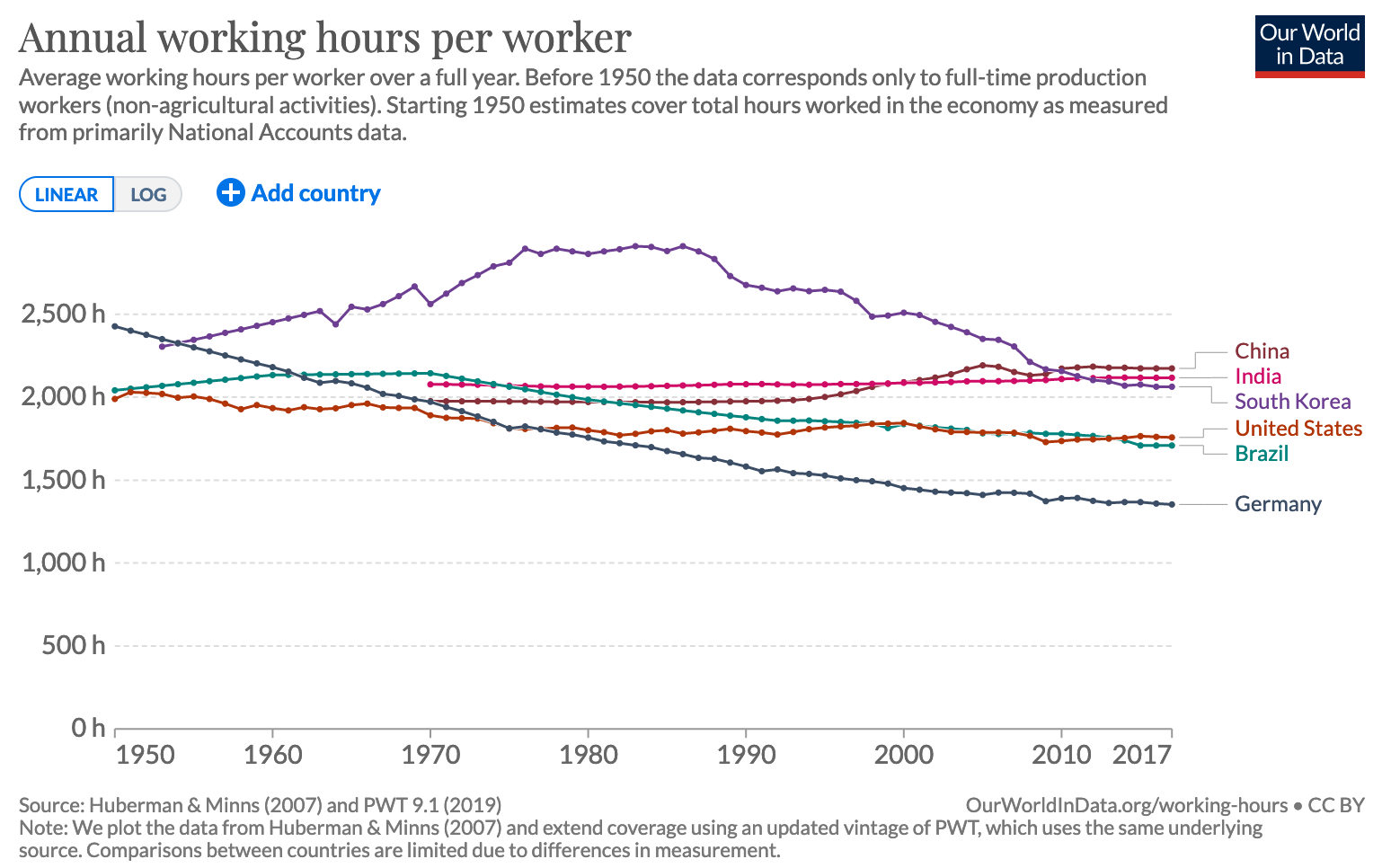
Data provided by Our World in Data, study conducted by [Huberman & Minns]( https://www.sciencedirect.com/science/article/abs/pii/S0014498307000058, https://www.rug.nl/ggdc/productivity/pwt/?lang=en).
Writers and researchers find many areas to blame for our abysmal working habits: constant connectedness, a fear of too much leisure making us lazy tv-bingers, workers' inability to say "no," and a slower-than-predicted rise in median income necessitating more work.
But the argument I've found most compelling is that we've simply created more jobs out of thin air.
The professional managerial class, or the people who manage other people for a living, make up 35% of American jobs. Over one-third of labor in America is not necessarily productive labor—it's managing other peoples' labor.
And it's been increasing along with our technological advancements. Just 1% of American labor in the 1930s was considered part of the professional managerial class. That rate rose to 24% in 1972, 28% in 1983, and 35% in 2006, the last point of data we have (I'd venture to say it's even higher now).
I'm not trying to bash managers. I'm just, well, confused about how I'm living through a technological revolution that has hardly even opened up the opportunity for new ways of working beyond the 9-to-5.
In many ways, the jobs of the Professional Managerial Class have become email jobs.
"Email jobs (noun): Jobs held by the laptop class that consist more or less entirely of sending and receiving email, which multiplies geometrically as a function of the number of email jobs, hence the pursuit of the impossible myth of Inbox Zero. See also: hamsters on treadmills."
— Marc Andreessen on Twitter
Email jobs are unfilling. They're inflexible. They're not what gets me, or really anyone in the world, excited about work. Holders of email jobs are:
-
Plagued with meetings, sitting in on meeting after meeting in order to disseminate information to a different group of people in yet another meeting.
-
Working on, well, email. Answering email becomes a key part of labor. Today, that may include Slack or Discord.
-
Stuck in the theater of bureaucracy: from employee evaluations to ever-lengthening spreadsheets.
How can DAOs get rid of email jobs, and open the door for many contributors to actually work less, which has been correlated with better health, less burnout, increased happiness, higher productivity, better decision-making, and even a less fire-and-doom outlook for planet earth?
I want to get granular with this article. First, we're going to look at how time is spent in the workday of a traditional organization versus that of a DAO.
I've worked in both traditional organizations and in DAOs. I reflected on my work days in these organizations and broke them down into four categories of time spent during a basic workday:
-
Bureaucratic work: endless email, paper-pushing, documentation disasters, extensive roadmap planning...think of this as "unnecessary" work that elicits a huge groan whenever you think about doing it.
-
Deep Work: Working on "the thing" you're hired to do. Keyword: output.
-
Governance: Making decisions, designing the organization, and building roles.
-
Meetings: time in calls (even if I was multi-tasking...shhhhh).
Here's a chart I made based on my own experience. The size of the circles equal my estimate of time spent in that area of work. The larger the circle, the more time I spent in that area. (Circles not to scale....we're talking in reflections and estimates, here.)
My experience is limited to a few organizations, but this is what I gathered based on my reflections:
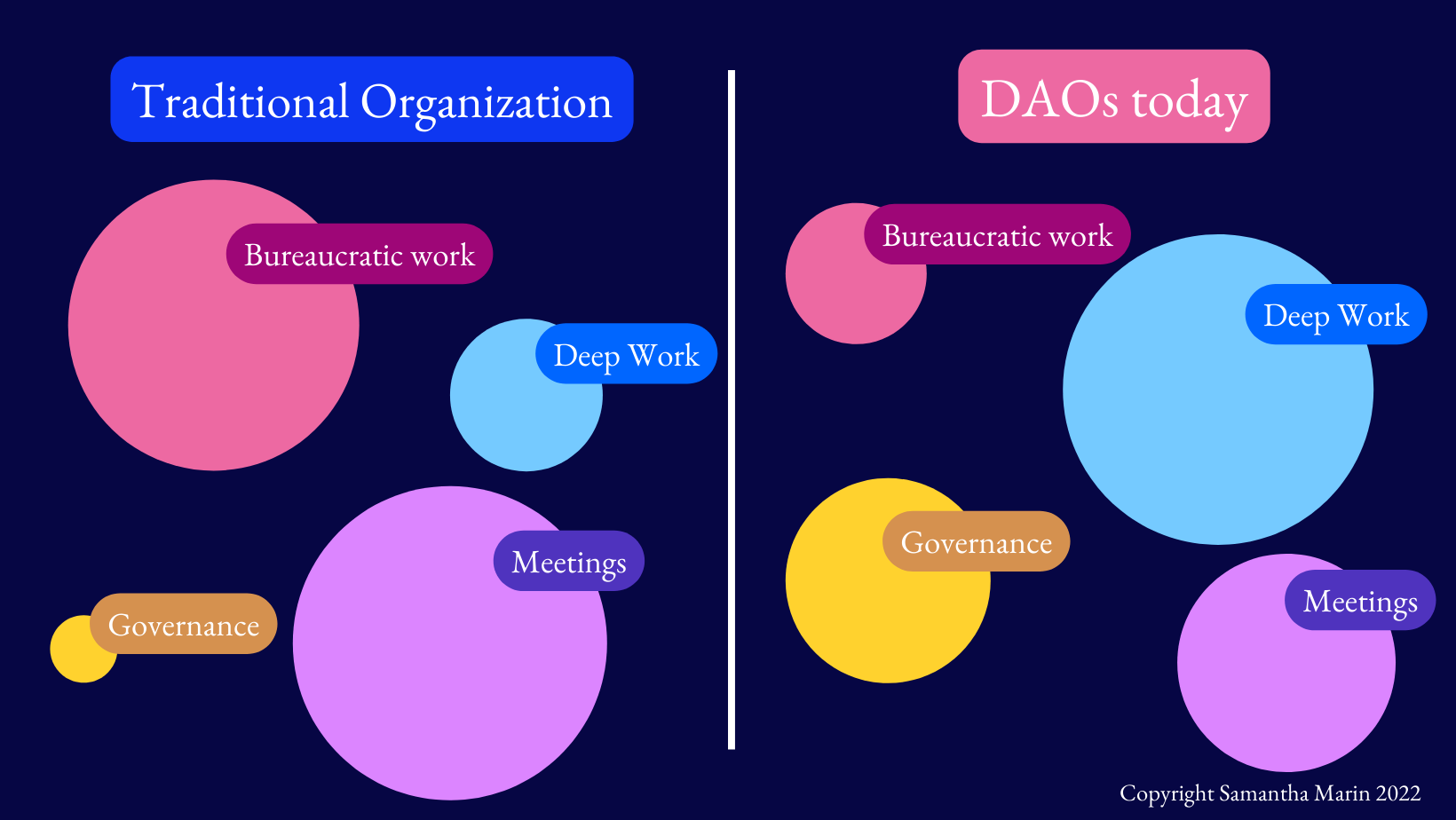
Probably balances out to the same number of hours per work week, right? I'd say so.
Let's look at the differences:
From my experience, DAOs today reduce bureaucratic work (they're new, so they have less organizational debt and paper-pushing processes) and reduce meetings (not as many stand-ups, updates meetings, or casual syncs, partly due to time zone differences).
However, DAOs increase time spent working on governance (participating in forums, voting, making decisions, having conversations around governance) and increase deep work (actually doing the thing, since many DAOs pay in bounty-structures, so you need to do the work to get paid).
Again, this is based on my own experience—take all of this as anecdotal, not statistical.
I'd argue that current DAO structures do not yet make a shorter workday feasible. But I see massive potential for them to do so in the future (and bring the death of email jobs along with them!), for three reasons:
-
Designing delegated voting or simplified governance.
-
Providing updates and information asynchronously, and getting really good at cross-time-zone and async conversation in general. This would further reduce time spent in meetings.
-
Creating smooth coordination processes that reduce time-consuming bureaucratic theater
Let's go into each one, briefly.
1. Delegated or simplified governance
Not all contributors want to be active in governance; it's human nature to be interested in different things.
With the rise of delegated governance and the potential for pod-based or guild-focused governance structures, I could see a world where DAO governance does not need to be the time sink it can be today.
However, active governance participation is a key difference between DAOs and traditional organizations—you get a voice rather than getting stuck in what someone else decides for you. So, I foresee governance in DAOs being a larger part of the workday than governance in traditional organizations, but not so large that it cuts into deep work.
Let's look at the chart, updated to show a smaller governance bubble:
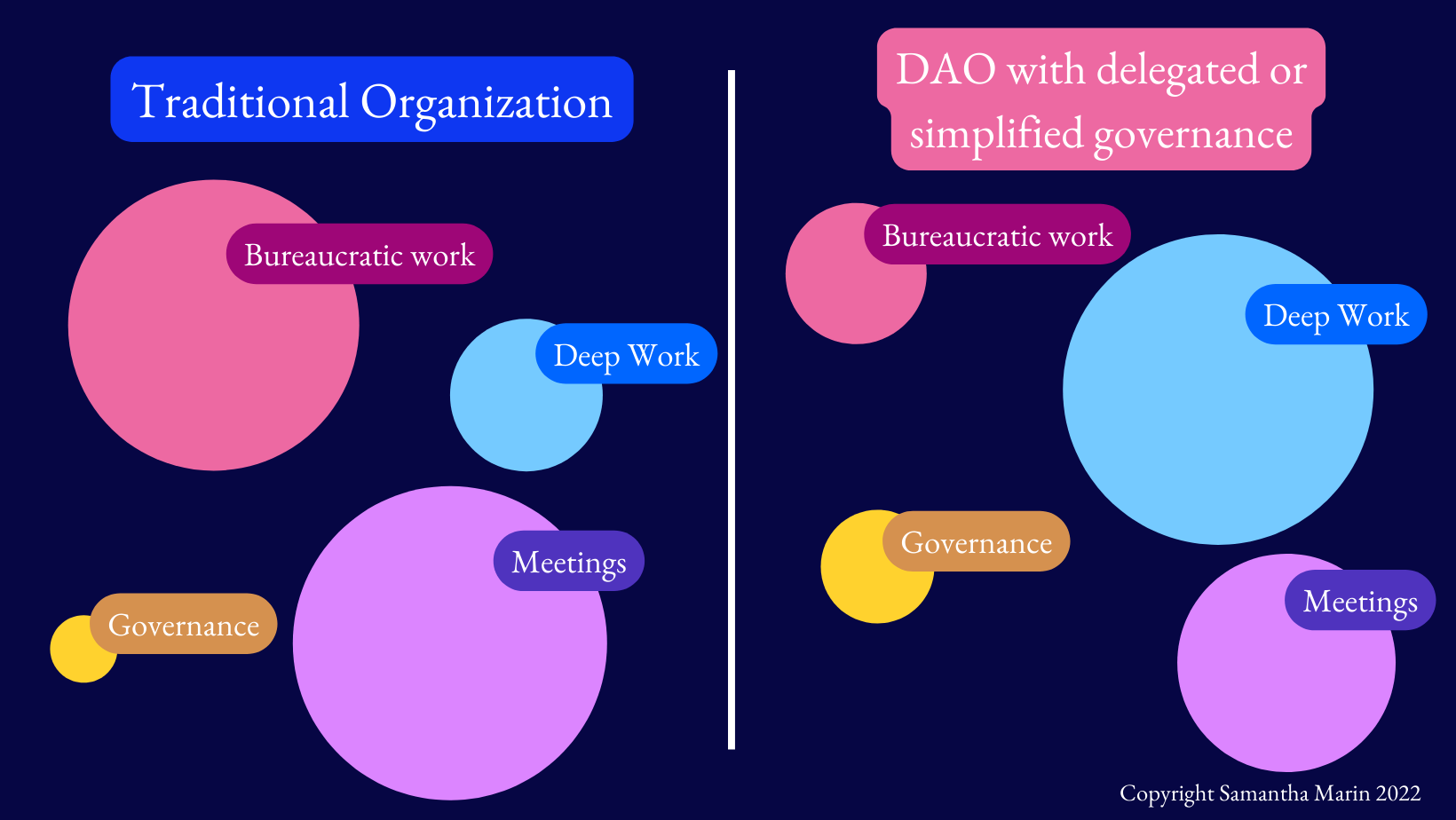
2. Reduced meetings due to dialed-in async processes
Because of the multinational nature of DAOs, people are spread across so many time zones that it's difficult to get everyone in the same (virtual) room at once. Async becomes the best way, and often the only way. People can share their updates in Discord chats or in internal DAO newsletters. A simple "update" meeting no longer needs to exist—or even can exist because of time-zone-tetris.
Brainstorming, small-team-alignment, and all-hands meetings will still be important in many situations. You can't replace the tremendous benefits of working with a small group synchronously. But with improved async communication processes, those meetings may gradually decrease.
Let's update that chart again:
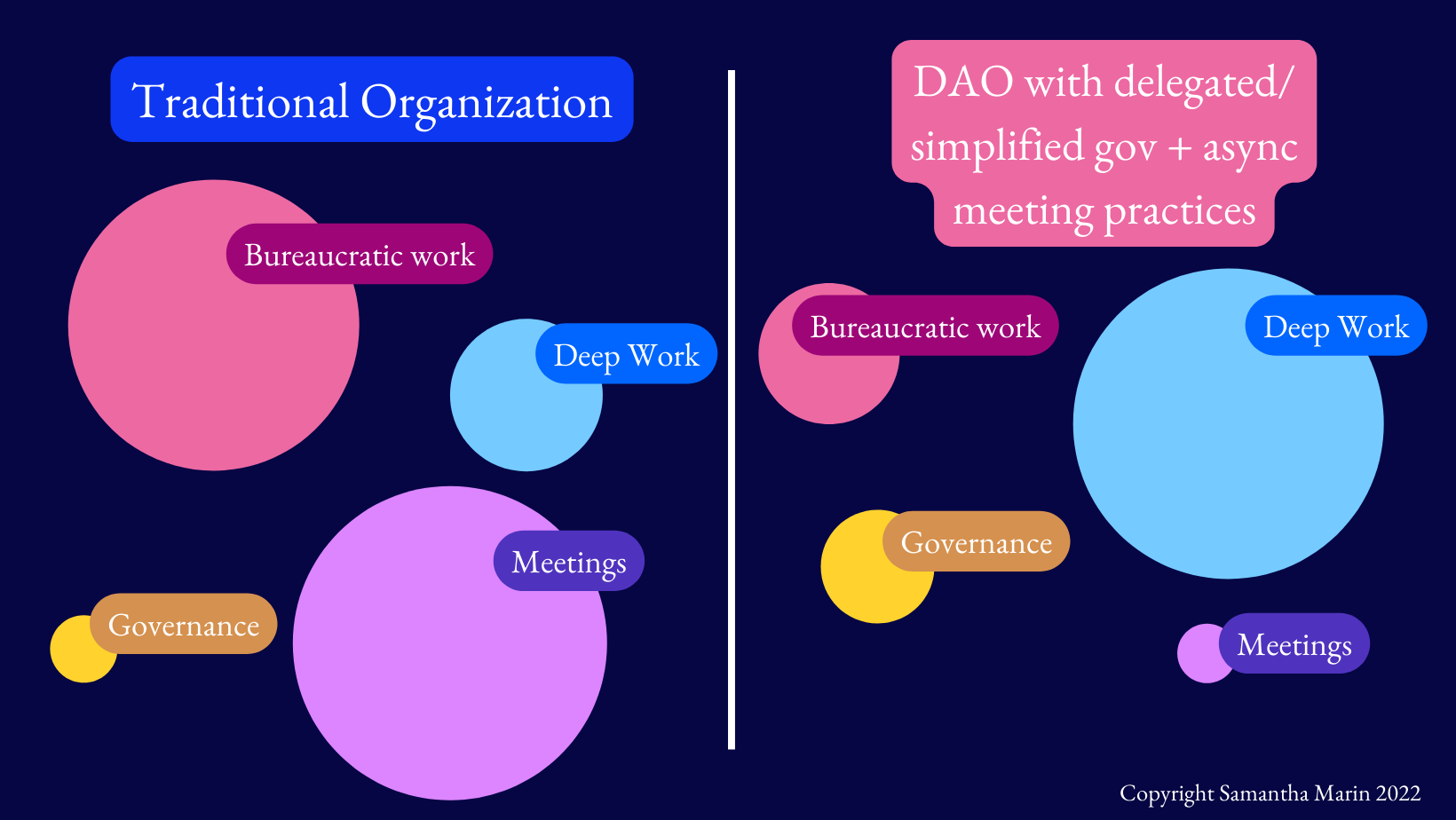
3. Creating smooth coordination processes that reduce time-consuming bureaucracy
Traditional companies spend a lot of time performing "bureaucratic theater," which is when companies hold meetings and request work purely for bureaucratic purposes, such as long updates meetings, performance reviews, detailed roadmaps that get thrown away the next day, and frequent budgeting.
Well-built information architecture that makes finding documentation easier is one way bureaucratic work can be reduced in DAOs. Smaller, leaner, cross-functional DAO teams that are trained in self-management and self-directed remote work could see a massive decrease in all of that "bureaucratic" work.
Next chart, please!
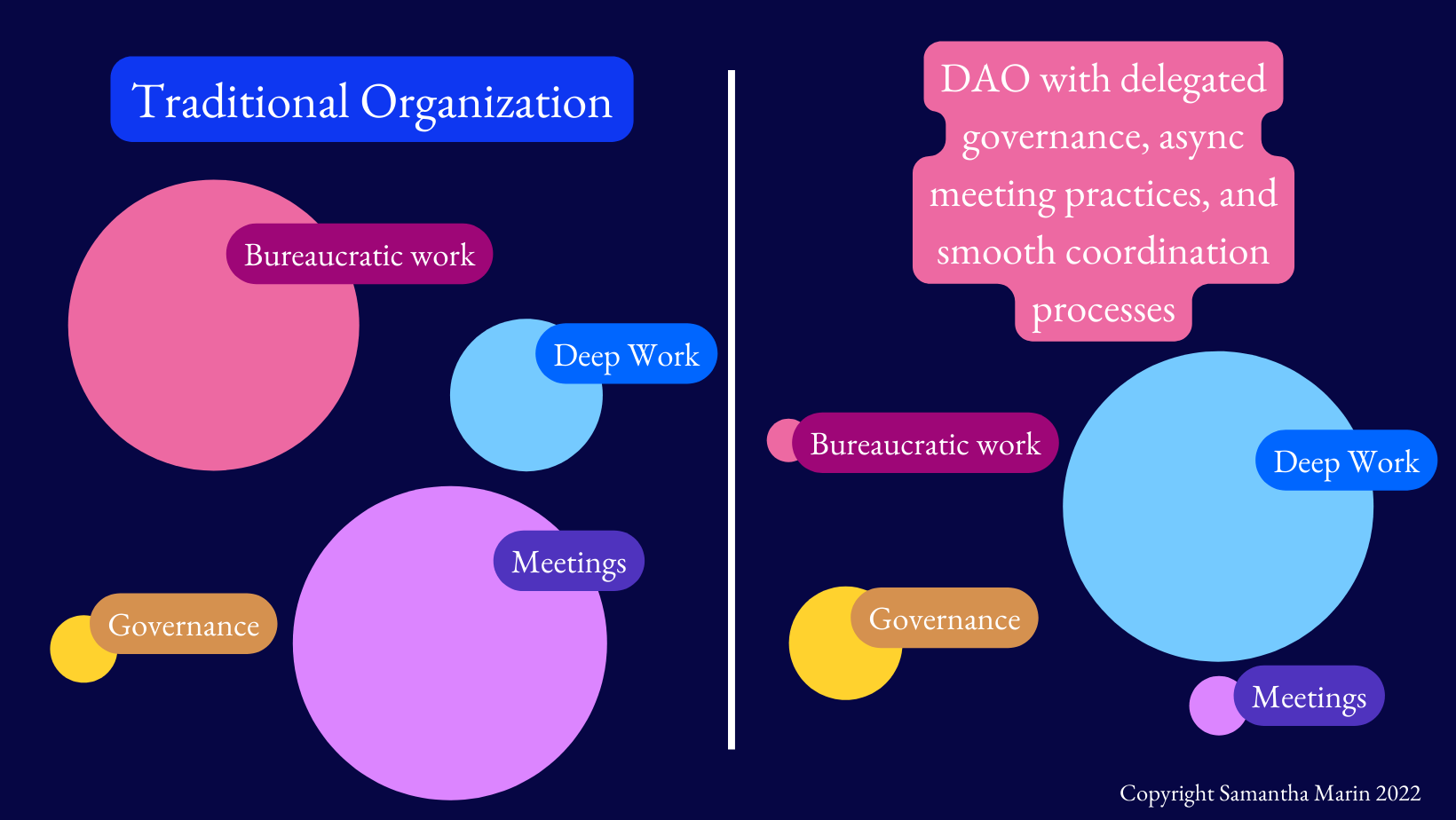
How’s that chart looking now? A better DAO workday?
Yeah....I know what you may be thinking. There's so much wishful thinking buried in those predictions. And, I get it. There is a lot of wishful thinking.
But, let me get granular one more time to show you....what does a shorter DAO work week really look like? How can we provide options for people to scale their work to what best fits them?
Let's look at the Glass of Work.
The Glass of Work: a brief look at how DAOs can provide greater work flexibility
The Glass of Work is a vessel that holds your working hours inside of it.
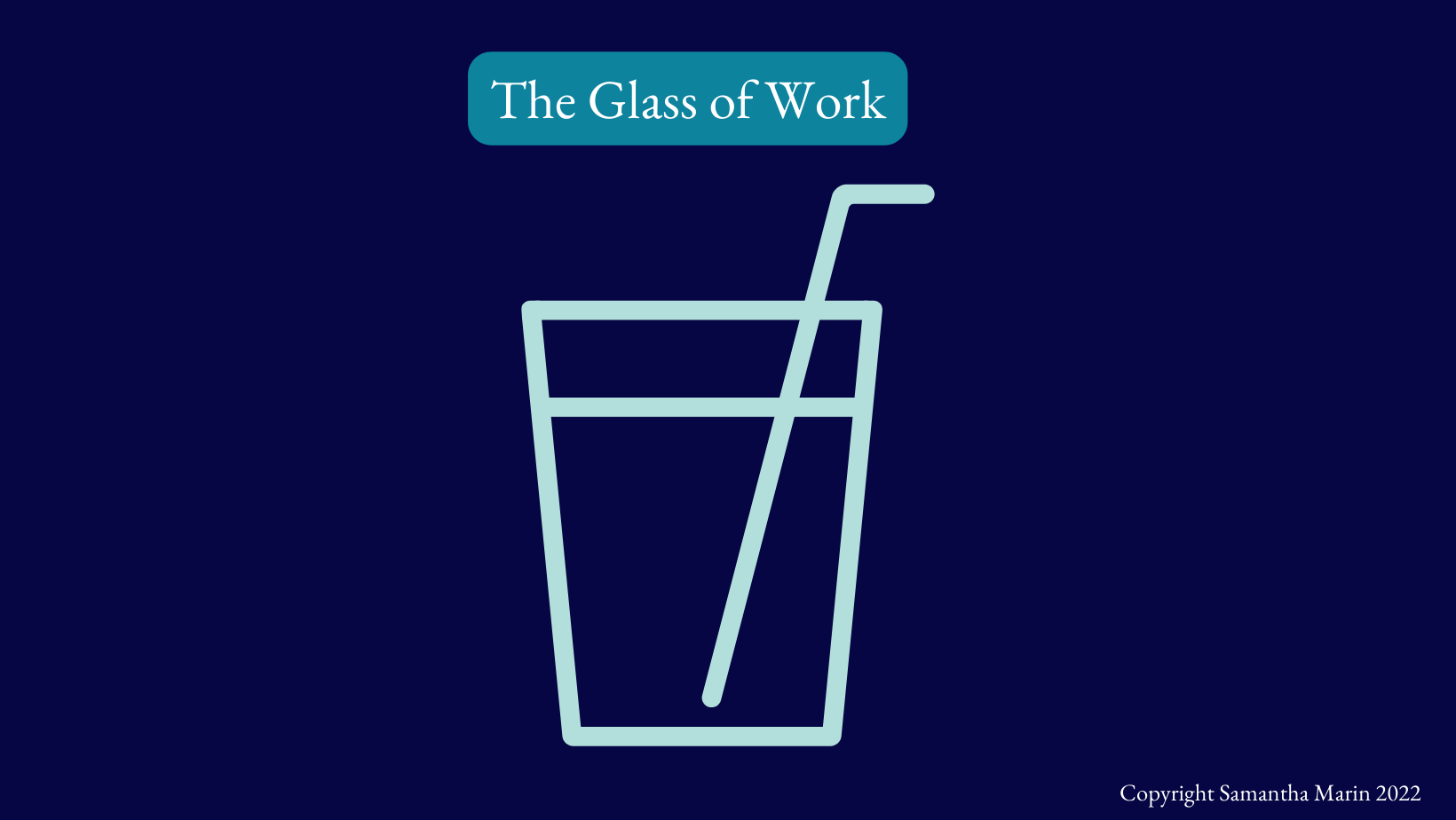
A full glass is the most you can do in your work life without burning out. This is the threshold for consistent work that doesn't lead to burnout.
An overflowing glass is burnout. Overflow = bad.
Your glass can be filled with any liquid you like. Mine's going to be strawberry lemonade to make this whole thing more fun.
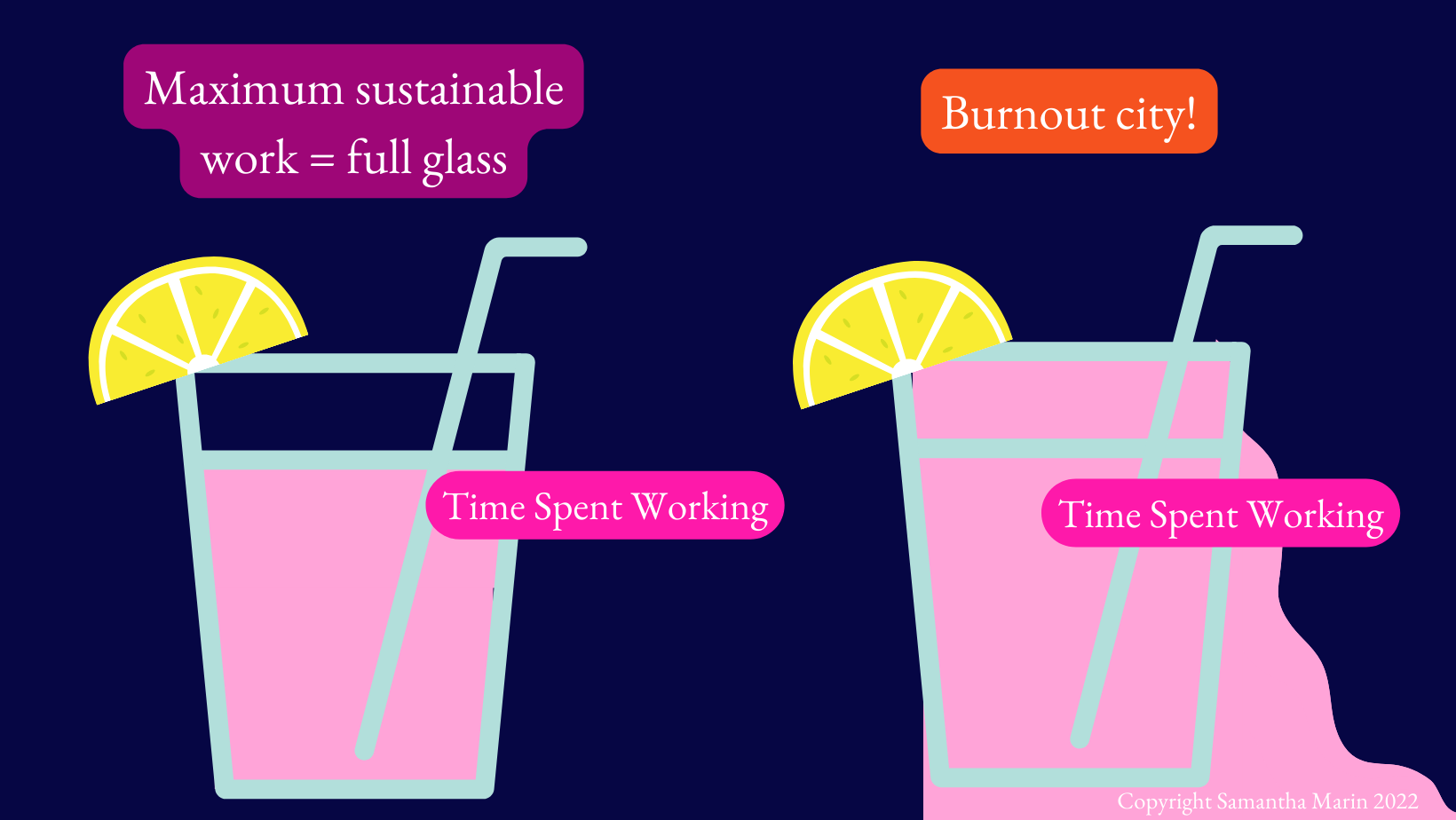
I imagine that a worker's Glass of Work will increase and shrink based on different life events, such as having children (shrink), getting excited about a new project (grow), or taking a sabbatical (shrink to a thimble).
Here's what the glass of work for the average work week looks like between a traditional organization and a well-optimized, efficient "future-state" DAO. I'm estimating a 40ish-hour max work week for an average worker to perform to not start falling into burnout. But everyone's glass will be a little different in size.
How is each organization type filling their Glass of Work? What measurements of ingredients do we see?
Here's what I hypothesize, based on the charts above:
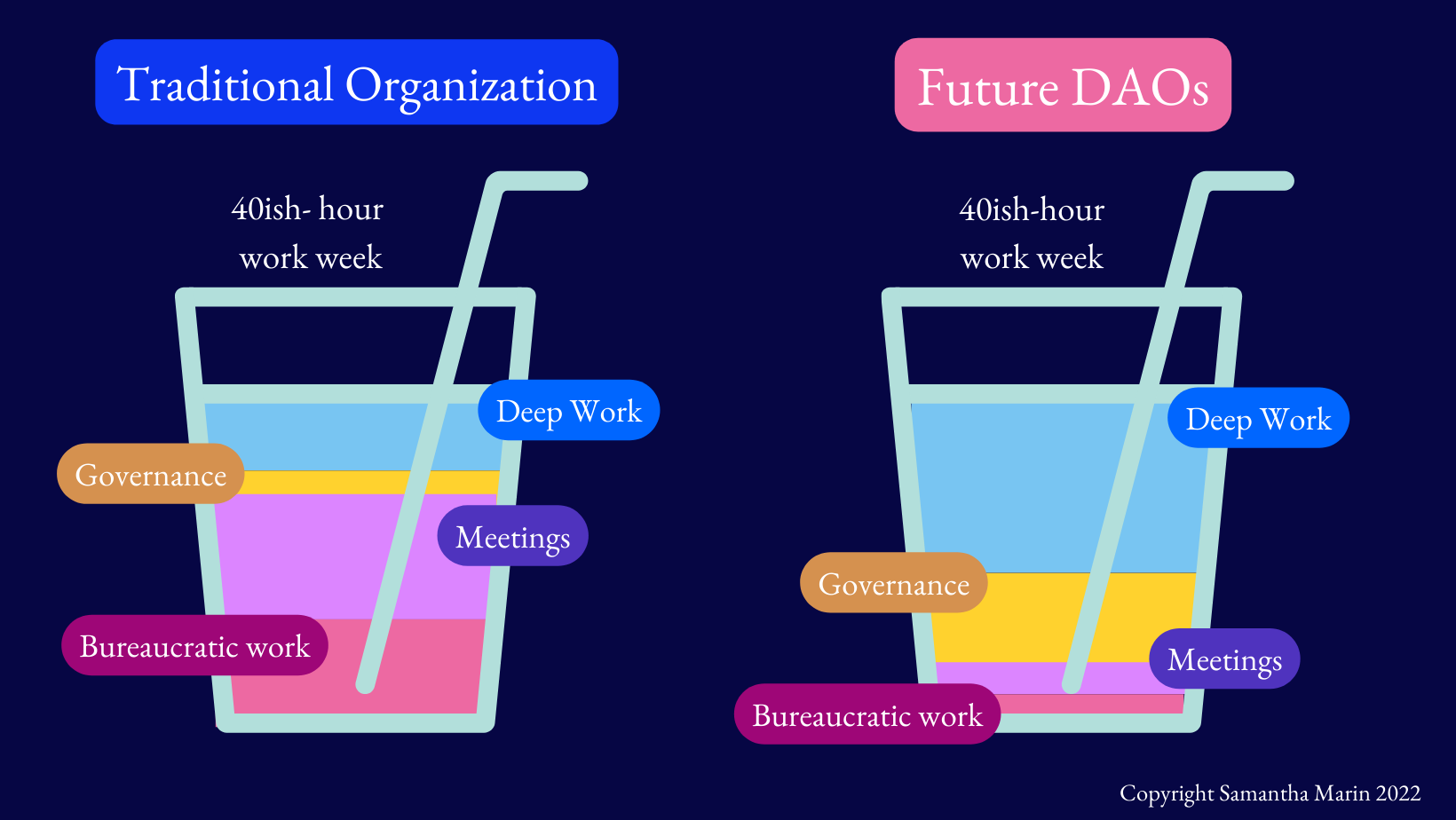
But I've been thinking.....does the glass need to be full? Why must we be walking the tight-rope of burnout, 24/7? Why are we resting to work, rather than resting for the sake of resting?
Why do we need the full glass of strawberry lemonade every day?
Let's look at some breakdowns for less-full glasses:
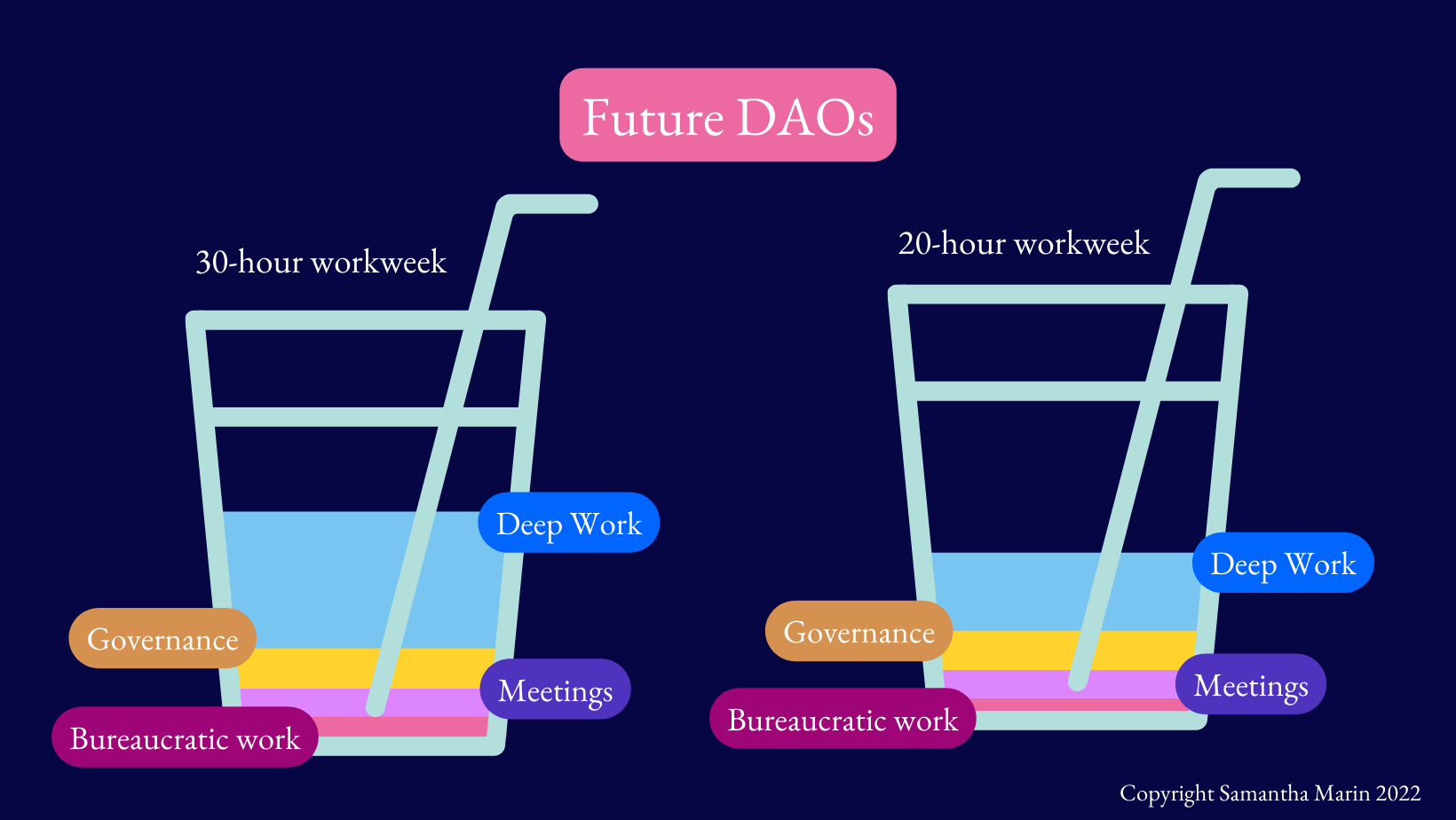
A DAO worker with a shorter work week might simply scale back a bit of everything, taking the biggest chunk out of deep work. Because of the flexible, modular working systems of many DAOs today, there's a potential for workers to get part-time work that is deeply fulfilling and aligns with their interests—not a part-time gig working for minimum wage.
And, with the emphasis on deep work rather than, well, everything else, those email jobs might get up and fly away.
I don't know about you, but that's a future of increased opportunity that I want to work toward. Call it wishful thinking, but a world where we get to work on what we love and coordinate better? That's what gets me excited to work in the DAO space.
And it helps more than just current DAO contributors. A world of fewer email jobs and more fulfilling, deep work with flexible hours helps a lot of people.
It helps....
-
Those who take on the majority of childcare duties, and therefore need a more flexible schedule.
-
Introverts who don't thrive in constant meetings.
-
Night owls who work better after 9pm and early-birds who work better before 9am.
-
Northern-dwellers who have the bulk of their sunlight hours during the traditional 9-to-5 workday.
-
Those who like to exercise, or simply go outside, when the sun is up.
-
Anyone living with a health condition—mental or physical—that makes working for a straight block of time difficult. Anything from chronic fatigue to back problems to ADHD could fall into this category.
-
Anyone who is a caretaker or takes on the variety of domestic work tasks.
I'd venture that you or someone you know fits into at least one of these categories.
The in-office, 9-to-5 workday was made for very few people. DAOs have the unique opportunity to turn outdated working habits upside down and open up sustainable work to everyone.
But there’s one big problem: contributors often have to work in multiple DAOs to make a full-time living
**Right now, people have to work a lot to get paid a normal salary in DAOs. Some contributors split their time between up to five DAOs in order to make a full-time living. **
Spencer Graham wrote for The Defiant, "DAOs should create ways for contributors to make longer term commitments, and even encourage and incentivize such commitments as a way of retaining their talented contributors." In other words, DAOs should treat their contributors more like long-term employees, less like part-time freelancers or temp workers.
A DAO optimized for full-time, flexible, talented contributors? I have a couple ideas. But that's a newsletter for another day.
We’re building a better world of work every day. It will take time, but we’re getting there.
DAOs are revolutionary through more just than their voting practices or on-chain potential. They're revolutionary in how we can make work more equitable, and more adaptable to the ever-changing world we live in, for everyone.
As Jonathan Malesic wrote in an editorial titled The Future of Work Should Mean Working Less, "Your job, or lack of one, doesn’t define your human worth. This view is simple yet radical."
I look forward to a world where that simple statement can be accepted widely, and no longer be radical. Will we get to Keynes' 15-hour work week? Maybe, maybe not. But I'm excited about being part of the journey to improve work, and widen the scope of work options and flexibility for everyone.
Recommended Reading
-
Economic Possibilities of Our Grandchildren (pdf) by John Maynard Keynes
-
The Solution to Just About Everything: Working Less by Rutger Bregman
-
Professional Managerial Class Wikipedia page
-
The Future of Work Should Mean Working Less by Jonathan Malesic
-
A Big Test for DAOs: Honing New Compensation and Contribution Practices by Spencer Graham
-
How to Eliminate Organizational Debt by Aaron Dignan
Quorum is a metalabel for creators shipping work about DAOs. Check out Quorum’s newsletter, podcast, and Twitter.